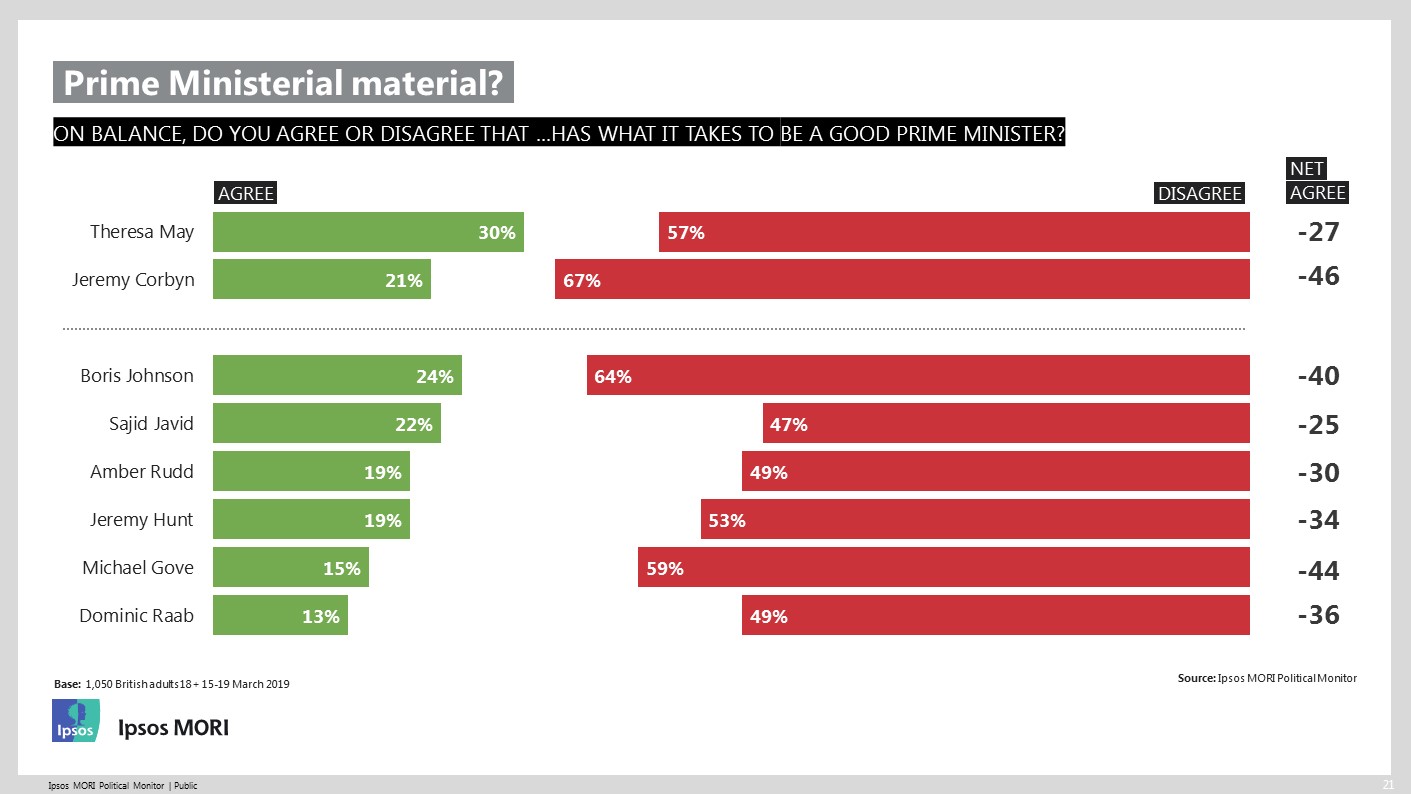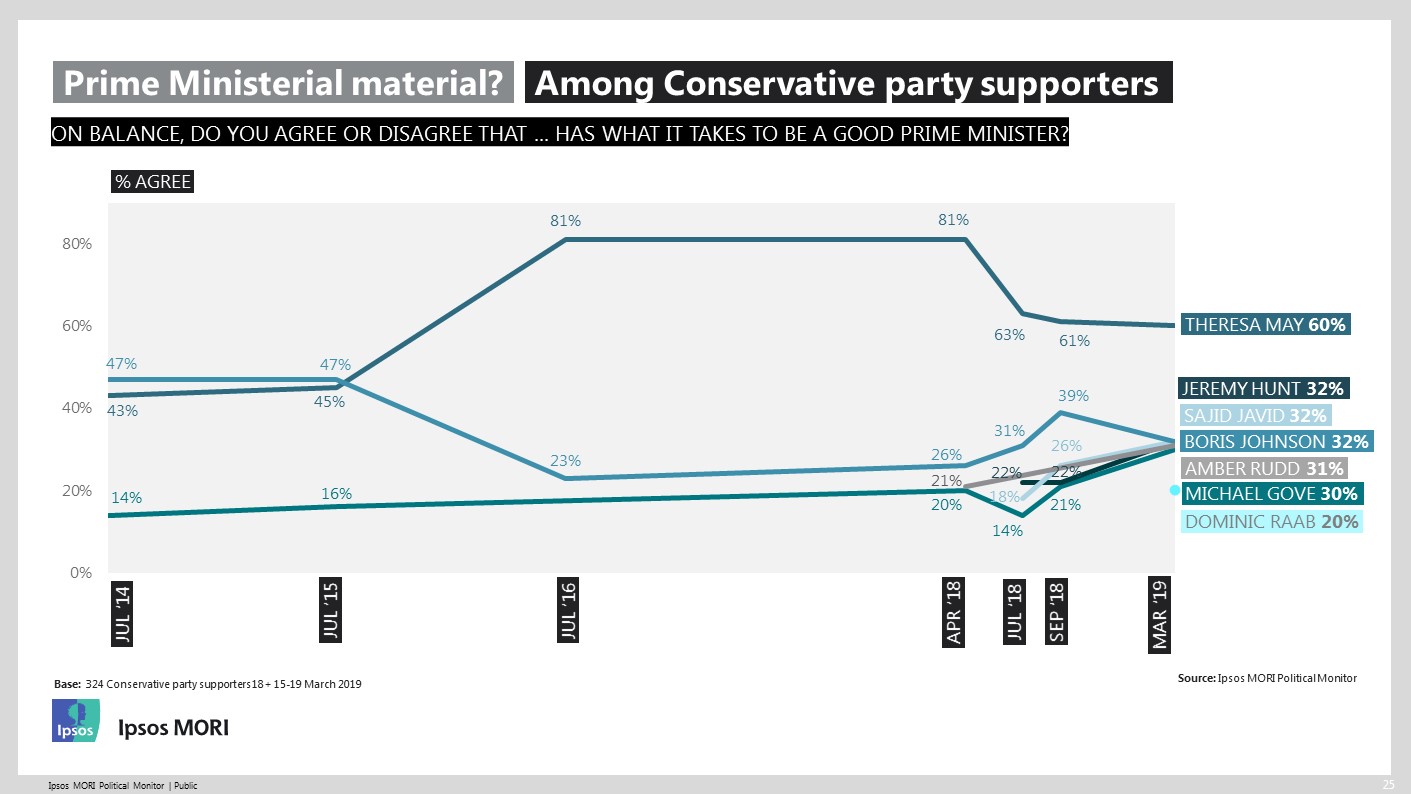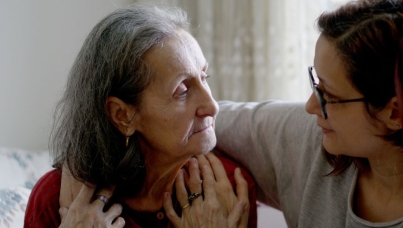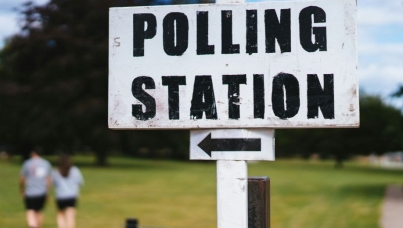Support for May falls again, but she is still seen as more Prime Ministerial than alternatives
- Support for Theresa May as PM falls again, but she is still seen as more Prime Ministerial than the alternatives
- No clear leader among potential successors in public opinion
The latest Ipsos Political Monitor shows an increase in the proportion of the British public thinking the Prime Minister should step down as soon as possible, and her worst ratings yet for having what it takes to be a good Prime Minister. However, despite how poorly the British public believe the Brexit process has gone, Theresa May is still viewed more favourably than Jeremy Corbyn and her potential Conservative successors.

The poll shows three in ten Britons agree that she has what it takes to be a good Prime Minister (30%, down from 33% last September), with 57% disagreeing (up from 53%). Although these figures are her lowest since becoming PM they are still higher than her Labour counterpart, for whom one in five (21%, down six points) think Jeremy Corbyn has what it takes to be a good PM while two-thirds (67%, up seven) disagree.
Theresa May is also viewed more favourably than potential Conservative successors. For Sajid Javid (who has seen both his agree and disagree ratings rise since September), Jeremy Hunt, and Amber Rudd, around one in five of the public think they have what it takes to be a good Prime Minister, but around half disagree. These three rate more favourably than Boris Johnson (24% think he has what it takes but 64% disagree), Michael Gove (15% vs 59%) and Dominic Raab (13% vs 49%).
When looking at the field amongst Conservative supporters Theresa May still receives the highest scores. Three in five (60%) Conservatives agree that she has what it takes to make a good PM (30% disagree, up seven since September). None of the challengers receive a net positive rating, but there have been changes in views towards them. Around one in three believe each of Jeremy Hunt (32%, up ten points since September), Sajid Javid (32%, up six), and Amber Rudd (31%, up ten since April) have what it takes, but around two in four disagree (36% Hunt, 38% Rudd, 40% Javid). One third also say Boris Johnson has what it takes, but six in ten disagree, and his ratings have fallen since September (32% agree, down seven, 58% disagree, up seven). Michael Gove has also seen an improvement in his position since September with 30% of Conservative supporters agreeing he has what it takes (up nine) and 45% disagreeing (down six), while one in five (20%) say Dominic Raab has what it takes (44% disagree).

The public remain split on exactly when they think Theresa May should step down, but most think it should be before the next general election, and there has been an increase in those who say she should resign as soon as possible. Just over a third (36%) think the Conservatives should change their leader as soon as possible, up 7 points from September. Three in ten (30%) think they should change their leader once Britain has left the EU but before the next general election (no change) while a quarter (24%) think it should be done after the next general election (down 8 points). Just 17% of Conservatives think it should be done as soon as possible while 39% say after Brexit but before the next general election, and 36% say after the next general election – figures amongst Conservative supporters have changed little since September last year.
Gideon Skinner, Head of Political Research at Ipsos, said:
Theresa May’s credentials as Prime Minister in the eyes of the public are the lowest they’ve been since she got the job, and even a majority of her own party supporters think she should go before the next general election. In the race to succeed her, there are signs that several of the challengers are strengthening opinion among Conservative supporters (although Boris Johnson has slipped back), but the public at large aren’t greatly attracted by any of them. This means there is no clear leader of the chasing pack, and even among their own voters there is still ambiguity towards the alternatives, with around three in ten yet to come down on one side or the other for most of them. Of course, the election itself when it happens will be among MPs and party members, who may have different views – but the ability of the challengers to pick up wider public support should be part of their decision-making
- Access our long term social and political trends or more findings from the Ipsos March 2019 Political Monitor.
Technical Note
Ipsos interviewed a representative sample of 1,050 adults aged 18+ across Great Britain. Interviews were conducted by telephone 15th – 19th March 2019. Data are weighted to the profile of the population. All polls are subject to a wide range of potential sources of error. On the basis of the historical record of the polls at recent general elections, there is a 9 in 10 chance that the true value of a party’s support lies within 4 points of the estimates provided by this poll, and a 2 in 3 chance that they lie within 2 points. The Independent Group and the Brexit party were added as unprompted options to the voting intention questions this wave.






